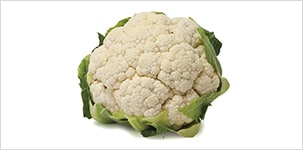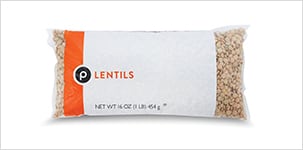Updated September 6, 2021
Proper diet and nutrition are integral to our overall health. But with so much information about different diets, eating plans, and foods to include or avoid, it’s easy to feel lost when trying to decide what you and your family should eat.
Our registered dietitian nutritionists are here to help with answers to ten common nutrition questions that cover everything from carbs to metabolism.

Shannon McManus, RDN, LDN
Publix Dietitian
Top ten nutrition questions.
Take a look at some of the nutrition questions our dietitians hear from our customers, complete with explanations and practical advice.
-
Are carbs bad?
Though carbohydrates often get a bad rap, they can provide essential nutrients such as fiber, vitamins, and minerals. Rather than eliminating carbs altogether, focus on consuming the types of carbs that can fit into an overall balanced diet.Here are some guidelines for choosing carbs:1
- Limit foods that are high in processed, refined simple sugars—they provide calories, but have very little nutritional value.
- Choose nutrient-dense options such as fruits, vegetables, whole grains, beans, and legumes.
Keep in mind that today’s popular high-fat, low-carb diets may offer short-term weight loss success, but long-term results are unknown.2
-
Which supplements should I take?
Talk to your healthcare provider to help determine which supplements, if any, are right for you.Supplement packaging may claim to prevent illness, improve energy, boost metabolism, or even brighten your skin. Unlike medications, which must be approved by the FDA before they can be marketed, dietary supplements do not require premarket review or approval by the FDA.3
Be sure to research supplements you are considering. Rather than rely on the claims on the packaging, check a reputable source such as the US National Library of Medicine.
-
Are organic foods healthier?
Organic is a USDA-defined labeling term that relates to the way foods are produced rather than their nutritional value. There’s no conclusive scientific evidence that organically produced foods are higher in nutrients.4To be labeled organic, a product must meet federal standards for production, processing, and certification under the Organic Food Production Act of 1990. The national organic standards forbid the use of many synthetic fertilizers and pesticides, sewage sludge, irradiation, and genetic engineering to grow fruits, nuts, vegetables, and grains. Organic meat and poultry cannot be irradiated. The animals must have access to the outdoors (except under specific conditions such as inclement weather), and they can’t be given any growth hormones, antibiotics, or other drugs. All feed must be 100% organic (except for trace minerals and vitamins), with no animal by-products.5
Choosing organic foods is a personal decision. If your goal is to limit your exposure to pesticides, antibiotics, and hormones, or if you have concerns about environmental impact, then organic foods may be for you.6 While you shop, look for the USDA Organic and Made with at Least 70% Organic Ingredients icons.
Try an easy new recipe that incorporates organic and plant-based ingredients: Asian-Style Cauliflower Tacos with Peanuts.
-
What’s the best diet to follow?
The best diet is one that works for you and also meets your nutritional needs. It may be tempting to follow the latest fad diet, but before you do, consider these factors:7- Is it flexible? A flexible eating plan does not forbid certain foods or food groups, but instead includes a variety of foods from all the major food groups.
- Is it balanced? Your diet should include adequate nutrients and calories. Eating large quantities of certain foods, drastically cutting calories, or eliminating entire food groups can cause nutritional deficiencies.
- Is it viable? A diet should include foods you would enjoy eating for life, rather than ones you can tolerate temporarily. If you don't like the food on the plan, it’s overly restrictive, or it becomes boring, you probably won't stick to it.
-
Do you recommend detoxes?
Detox diets are generally short-term dietary interventions designed to eliminate toxins from your body. A typical detox involves a period of fasting, followed by a strict diet of fruit, vegetables, fruit juices, and water. While some people report that they feel more focused and energetic during and after detoxes, there's little evidence that these diets actually remove toxins from the body. Your body can clear itself of most toxins naturally.7Skip the detox and focus on eating a balanced diet including fruits and vegetables, whole grains, fat-free or low-fat dairy, and lean proteins. Limit saturated fats, added sugars, and sodium.
-
Is intermittent fasting a good idea?
Intermittent fasting is a popular method for weight control and improved health. It may include alternating zero-calorie days, significantly cutting calories two days per week, fasting three days per month, or extended overnight fasting between the evening meal and breakfast the next morning. Research shows that alternate-day fasting and periodic fasting may be effective for short-term weight loss, but there isn't enough evidence to determine its long-term effects.8Pregnant or breastfeeding women, or those who are underweight or have a history of eating disorders, should not undertake an intermittent fasting program. Diabetics or people taking medications should consult their doctors before starting any program.9 If you decide to try it, make sure that you check with your physician first.
-
I’d like to help my kids cut back on sugar. Are sugar substitutes a good idea?
Many parents are concerned about their children’s eating habits—especially sugar intake, which has been linked with hyperactivity, diabetes, obesity, and chronic diseases. It’s important to monitor the amount and types of sugars your children consume. Educate yourself on the different types of sugar and learn more about strategies to limit added sugars for kids.When it comes to sugar substitutes, moderation is the key. Artificial sweeteners don't contain calories and include saccharin (Sweet‘N Low), aspartame (Equal), and sucralose (Splenda). Despite controversy surrounding these sweeteners, the FDA recognizes them as safe to use. Other sweeteners, such as stevia and monk fruit extract, are derived from plant-based sources, yet are still processed.10
-
Are plant-based diets better for you?
Plant-based eating is popular, and more people are interested in trying it as a way to improve their health. Research shows that plant-based eating patterns, including Mediterranean and vegetarian diets, may support weight loss and help lower the risk of heart disease.11 Keep in mind that these diets include whole plant-based foods such as fruits, vegetables, whole grains, beans, legumes, and nuts, rather than highly processed products.12As you shop, you’ll see a lot of options, such as burgers made from plant-based protein or cheeses made from coconut oil. Just because foods are made from plants does not mean they are better from a nutritional perspective. Be sure to compare the nutrition facts for each product you consider. Get more tips on choosing plant-based foods. Try this hearty and delicious plant-based recipe: Lentil Bolognese over Zoodles.
-
What is gluten, and should I go gluten-free?
Gluten is a protein found in wheat, barley, rye, and triticale. Foods such as bread, pasta, soup, oats, and cereal often contain gluten.13For people who have celiac disease, ingesting gluten may damage the small intestine and cause long-term health problems. Some people have non-celiac gluten sensitivity, which may result in similar symptoms. Those with celiac disease or gluten sensitivity should avoid foods with gluten.14
For most others, a gluten-free diet does not offer proven health benefits and may result in nutrient deficiencies. Whole grains provide fiber, vitamins, and minerals; gluten-free products often contain refined grains and are lower in nutrients such as fiber, iron, folate, and B vitamins. People who eliminate gluten may feel better because they omit desserts and junk foods, many of which contain gluten, but going gluten free is not for everyone.
If you have celiac disease or gluten sensitivity, take a look at this article to ensure you get the nutrients you need. Keep your eyes peeled for our gluten free icon and recipes.
-
Can I boost my metabolism with certain foods or exercise?
While many people seek to boost their metabolism through food, exercise, and other tactics in order to burn more calories and lose weight, the truth is that it’s not so simple. Beware of metabolism myths!Foods such as green tea, caffeine, or chili peppers may provide small boosts in metabolism, but not enough to significantly affect weight loss. Cardiovascular exercise such as biking and running can help you burn calories, and you may keep burning calories after your workout, but only for about an hour. Resistance training or lifting weights results in a gain in muscle mass. Muscle burns more calories than fat, but most regular exercisers just gain a few pounds of muscle. It is not enough to make a big difference in the number of calories you burn. If you load up on high-calorie items after a workout thinking your body will keep burning them for the rest of the day, you may risk gaining weight. Be sure to refuel with healthy foods.
Rather than try to boost your metabolism, the best way to achieve and maintain a healthy weight is to exercise regularly and eat a balanced diet with the right portions.15
Ask a dietitian.
Do you have additional questions related to nutrition, products, or dietary concerns? Feel free to ask our dietitians directly.
For the love of you.
Choosing how you eat is uniquely personal. It’s about your needs, your preferences, and your goals. As your wellness ally, we're in your corner with fresh ideas, recipes, and wellness icons that make it easier to shift toward wiser food choices. It’s all about you, at your very best.
Sources
1 Carbohydrates. American Heart Association. April 16, 2018.
2 Mayo Clinic. Low-Carb Diet: Can It Help You Lose Weight? Mayo Foundation for Medical Education and Research. August 29, 2017.
3 U.S. Department of Health & Human Services (HHS). Dietary Supplements: What You Need to Know. National Institutes of Health: Office of Dietary Supplements. June 17, 2011.
4 Thalheimer, Judith C., RD, LDN. The Organic Foods Debate — Are They Healthier Than Conventional? Today's Dietitian 15, no. 7 (July 2013): 28.
5 United States Department of Agriculture (USDA). Labeling Organic Products. Agricultural Marketing Service (AMS). December 2016.
6 Mayo Clinic. Weight Loss: Choosing a Diet That's Right for You. Mayo Foundation for Medical Education and Research. July 3, 2018.
7 Zeratsky, Katherine, RD, LD. Do Detox Diets Offer Any Health Benefits? Mayo Foundation for Medical Education and Research. April 27, 2018.
8 Webb, Densie, PhD, RD. Fasting Regimens for Weight Loss. Today's Dietitian 20, no. 2 (February 2018): 34.
9 Gordon, Barbara, RDN, LD. What Is Intermittent Fasting? EatRight.org. May 7, 2019.
10 Flipse, Robin, MS, MA, RDN. A Sweetener by Any Other Name Is Just as Sweet. Calorie Control Council. Accessed February 4, 2020.
11 Sofi, F., M. Dinu, G. Pagliai, et al. Low-Calorie Vegetarian Versus Mediterranean Diets for Reducing Body Weight and Improving Cardiovascular Risk Profile: CARDIVEG Study. Circulation 137, no. 11 (March 13, 2018): 1103-13.
12 Ambika, Satija, and Frank B. Hu. Plant-Based Diets and Cardiovascular Health. Trends in Cardiovascular Medicine 28, no. 7 (October 2018): 437-41.
13 Celiac Disease Foundation. What Is Gluten? Celiac.org. Accessed February 4, 2020.
14 Celiac Disease Foundation. What Is Celiac Disease? Celiac.org. Accessed February 4, 2020.
15 MedLine Plus. Can You Boost Your Metabolism? U.S. National Library of Medicine. April 23, 2018.

 You are about to leave publix.com and enter the Instacart site that they operate and control. Publix’s delivery and curbside pickup item prices are higher than item prices in physical store locations. Prices are based on data collected in store and are subject to delays and errors. Fees, tips & taxes may apply. Subject to terms & availability. Publix Liquors orders cannot be combined with grocery delivery. Drink Responsibly. Be 21. For prescription delivery, log in to your pharmacy account by using the Publix Pharmacy app or visiting
You are about to leave publix.com and enter the Instacart site that they operate and control. Publix’s delivery and curbside pickup item prices are higher than item prices in physical store locations. Prices are based on data collected in store and are subject to delays and errors. Fees, tips & taxes may apply. Subject to terms & availability. Publix Liquors orders cannot be combined with grocery delivery. Drink Responsibly. Be 21. For prescription delivery, log in to your pharmacy account by using the Publix Pharmacy app or visiting 


